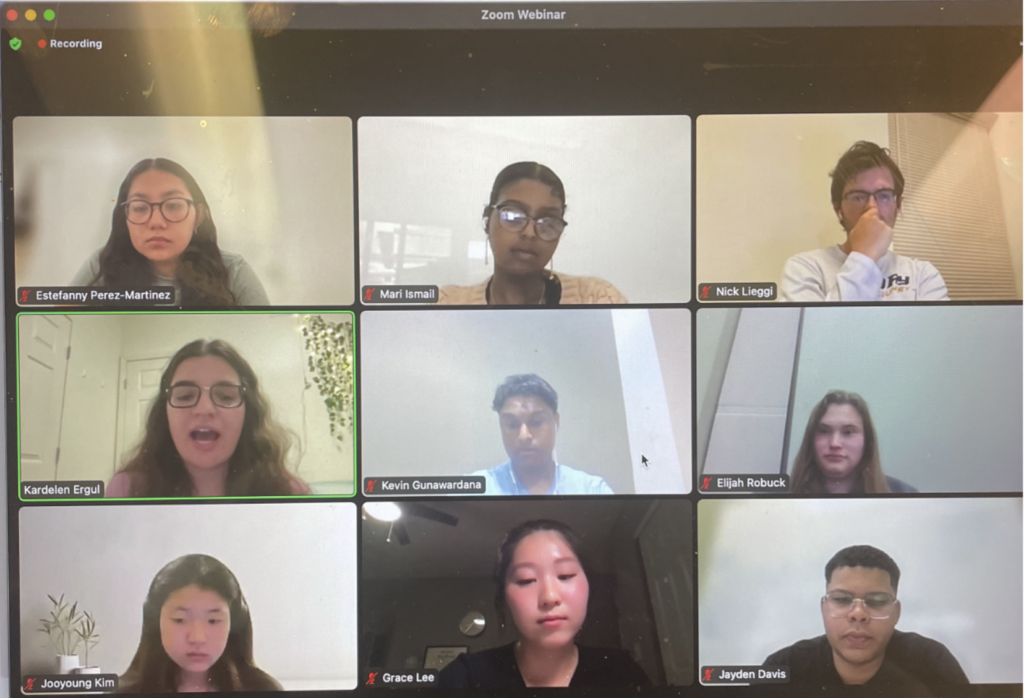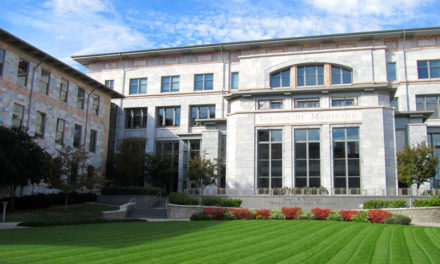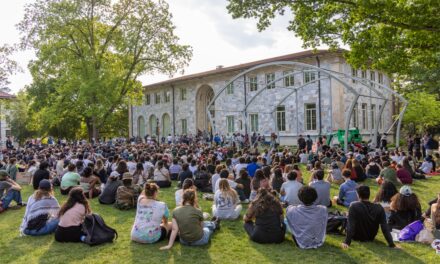Constitutional Council Chief Justice Kardelen Ergul (24C) delivered the Council’s findings for the case “Davis and Robuck v. Elections Board” in an email to The Emory Wheel in the early morning of April 11. In a unanimous decision, the Council found that the Elections Board “was negligent at times” but did not “seriously” violate the Student Government Association (SGA) Constitution or “[misuse] its powers of interpretive authority.” Therefore, the Council decided not to remedy the appeal and that President-elect Abigail Dubinski (25B) could transition into her new position on April 15.
Jayden Davis (25B) and his campaign manager Elijah Robuck (26C) filed their appeal, which included three complaints, with the Constitutional Council on March 29 after the Elections Board dismissed their allegations of misconduct in the SGA presidential election.
First, the Davis campaign claimed that the Elections Board acted favorably toward Dubinski and SGA Vice President-elect Pranay Mamileti’s (25B) campaign. The appeal argued that Mamileti’s Letter to the Editor in the Wheel should have been a Tier Three campaign violation instead of Tier Two. Part VII, Article 1I of the SGA Code of Elections states that Tier Three violations are “reserved for cases that are clear and intentional violation of the Elections Code that gives a candidate a clear advantage in the campaign.” If their campaign received a Tier Three violation, the Elections Board would have removed Dubinski and Mamileti from the election ballot.
However, the Constitutional Council ruled that the Elections Board acted “reasonably” in ruling Mamileti’s letter a Tier Two violation.
Secondly, the Davis campaign alleged that the Elections Board acted negligently and lacked integrity when investigating their claims that the Dubinski campaign participated in election misconduct, including voter intimidation, fraud, bribery and harassment. The decision stated that although the Elections Board is required under Part VII, Article 1H of the Code of Elections to provide the Constitutional Council with records of testimonies and hearings in the event of an appeal, the Board did not provide such materials. This prevented the Council from understanding the Elections Board’s reasoning for rejecting the Davis campaign’s claims.
“The Council acknowledges that the Board might have various reasons for not accepting anonymous evidence and having closed hearings,” the decision reads.

The Constitutional Council holds a hearing for the case of Davis and Robuck v. Board via a Zoom Webinar on April 4. (Spencer Friedland/Managing Editor)
However, the Council found that the Elections Board failed “to adequately investigate and examine the information provided.” According to the decision, the Board neglected to verify the validity of the allegations of bribery and coercion.
“Such lapses in scrutiny not only undermine the integrity of the election process but also erode public trust in the institution responsible for upholding democratic principles,” the decision reads.
The Constitution Council found that the Elections Board should have taken further action to direct both sides to relevant university administration offices, which could have helped them throughout the appeals process.
Despite the Elections Board’s reported negligence, the Council found that it did “not change anything about the election outcomes.”
“As we have no way of knowing what would have happened if the Board had investigated the issue in detail and what punishments, if any, would have been given to the sides, our ruling has no effect on the results of the election but serves as a reminder to the future Board of Election members to take these matter more seriously and accept anonymous evidence when needed,” the decision reads.
Davis and Robuck’s final claim was that the Elections Board acted partially during the election process. The appeal claimed that a member of the Elections Board can still be partial toward a candidate despite signing a waiver of neutrality.
The appeal also stated that the Elections Board did not read the written complaint at the start of its March 3 hearing addressing the Davis Campaign’s allegations or keep the meeting public, both of which are required under Part VII, Article 1H of the Code of Elections. Additionally, the appeal alleged discrepancies in the amount of interruptions during rebuttals.
“Ananya Singh, Vice Chair of the Board of Elections, interrupted him multiple times — there was not one interruption given to Abigail and Pranay during their rebuttal,” the appeal reads.
The Constitutional Council decision agreed that Elections Board members “cannot simply be deemed impartial because of their signature on a form.” Despite this, the Council found that the steps taken by the Elections Board during the hearing, including Board members who were accused of bias recusing themselves, allowed the Board to uphold impartiality and abide by the SGA Code of Elections.
SGA President Khegan Meyers (24B), who explained that he does not believe Davis and Robuck’s claims were valid, said he was pleased with the Council’s decision.
“A disqualification or a new election would be disastrous for student outcomes,” Meyers said.
Due to the Davis campaign’s appeals, the Constitutional Council decided to present 12 recommendations to the Elections Board and SGA.
The recommendations include shortening the appeals timeline following the conclusion of SGA elections and providing more information on how to file appeals with the Constitutional Council. The Council also recommended that the Elections Board requires its members to sign neutrality waivers at the start of each semester, record and share all hearing proceedings with the Constitutional Council, investigate anonymous evidence and witnesses and make future hearings public “outside of extreme and exceptional circumstances.” Additionally, the Council recommended that SGA clarify the qualifications and punishment of each tier of violations and outline when candidates can and cannot publish statements in the Wheel.
According to the decisions document, it is up to the SGA Legislature to review the Council’s recommendations and determine if they wish to implement them. If the Legislature decides to implement recommendations that involve amending the Constitution, the student body will be able to vote on the changes.
Meyers said SGA is already reviewing the Council’s recommendations to identify the specific areas of the Elections Code the Council referred to. He added that he hopes to create a permanent group to evaluate the Elections Code.
“The revisions are already ongoing and I trust that we’ll have a productive outcome,” Meyers said.
In an email to the Wheel, Dubinski and Mamileti expressed that they are looking forward to serving the Emory community.
“We want to thank everyone who voted in this election, both those who voted for us and those who voted for other candidates,” Dubinski and Mamileti wrote. “We are excited to work with the Emory community to implement our platform and ensure our fellow students have the best experience possible.”
Spencer Friedland (26C) is from Long Island, New York and is the Emory Wheel's Managing News Editor. He is a Philosophy, Politics and Law major and has a secondary major in Film. Spencer is also a part of the Franklin Fellows program at Emory.






